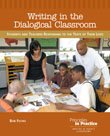 |
The end of the year always invites introspection. What troubles me now is that five years in, I still experience this process as an inventory of missed opportunities. At this time the full picture of my students' learning appears, in high, candid resolution. Why hadn't I noticed the chasm between students' understanding and my own assessment of it? The blemish of an unaddressed mistake or an unresolved oversight? The ugly scratches of students handicapped by prescriptive writing assignments, rubric-dependent rather than confidently autonomous?
Assessing this year's final picture has led me to some conclusions:
1. More frequent and descriptive formative assessments are in order next year.
2. Students must regard every writing assignment not only as worthwhile, but essential.
I have momentarily set aside the first resolution to focus on writing. Bob Fecho's book, Writing in the Dialogical Classroom (2011), is a robust manual written under the National Council of Teachers of English's (NCTE) Principles in Practice imprint.
Comparing the rich writing experiences of my own adolescence to the limited array I provided my students this year was painful--goadingly. Rather fortuitously, NCTE's advertisement for Fecho's book landed in my mailbox about a week into my angst, outlining a philosophy and framework for engaging students in authentic writing, in which their personal experiences and questions are in constant dialogue with other students' perspectives, with events in their own milieu and beyond, and with classroom texts.
The book has delivered on its publisher's promise. Among its principal insights:
1. Writing--frequent and intentional--should be rooted in students' lived experiences, in "the riches, embarrassments, victories, tragedies, conundrums, concerns, delights, and yes, even the routines of our lives" (28).
2. Writing is an inner dialogue. It helps us connect past experiences and written thoughts to present ideas, and we use these formulate future outcomes. It is a process of rereading and reviewing, while at the same time planning ahead, determining the ultimate meaning of present ideas.
2. Writing is an inner dialogue. It helps us connect past experiences and written thoughts to present ideas, and we use these formulate future outcomes. It is a process of rereading and reviewing, while at the same time planning ahead, determining the ultimate meaning of present ideas.
Fecho references Bahktin (1981): "All meaning comes through response [to reading and dialogue] and that response remains suspended between the past and the future" (18).
3. Writing is a dialogue with others. It is a non-linear process of reading/listening, evaluating, reacting to others' ideas, building on them, and reflecting on new ideas that emerge in the process.
4. An effective writing teacher recognizes these principles (paraphrased from p. 34):
The book's thoughtful commentary on authentic writing practice (from Fecho and several other teachers) is helping me compose a more encouraging picture of next year's students: ones who have taken charge of their own learning and writing development out of a deep feeling of necessity.
3. Writing is a dialogue with others. It is a non-linear process of reading/listening, evaluating, reacting to others' ideas, building on them, and reflecting on new ideas that emerge in the process.
4. An effective writing teacher recognizes these principles (paraphrased from p. 34):
- Learning is a never-ending collaborative and constructive process
- An effective learning community cultivates trust and camaraderie among its members
- Learners are motivated by a sense of shared purpose
- Fun and rigor are not mutually exclusive, but equally essential.
- Caring teachers do not shy away from the tensions of dialogue in diverse classrooms. Rather than keep these differences at bay, they establish expectations and relationships that make sharing these differences a more inviting prospect.
The book's thoughtful commentary on authentic writing practice (from Fecho and several other teachers) is helping me compose a more encouraging picture of next year's students: ones who have taken charge of their own learning and writing development out of a deep feeling of necessity.

No comments:
Post a Comment